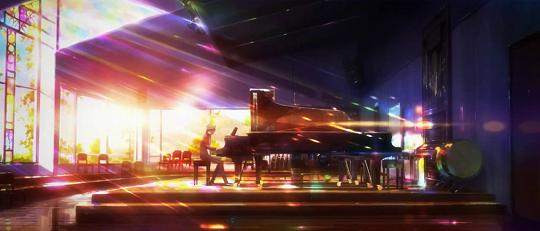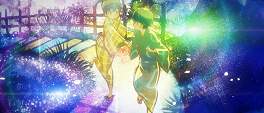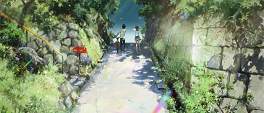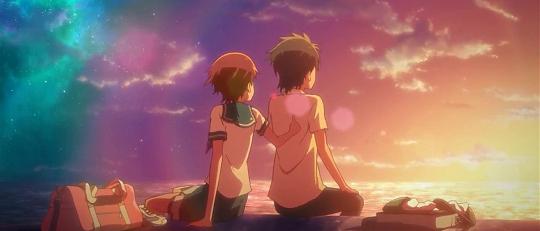It's fitting that in his introduction at the world premiere of Nerawareta Gakuen (literally: School In Peril, official: Psychic School Wars), Jonathan Clements mentioned that whenever The Girl Who Leapt Through Time is remade, so too is Nerawareta Gakuen. It's easy to see why: it has the same overall genre of a campus love comedy with strands of science fiction bubbling beneath it that makes the stories so endearing. Here though the time travel is a little woolier, the story a little more meandering and the visuals a whole lot more colourful.
Were you to take the skies of a Makoto Shinkai work and push them through a high-powered kaleidoscope, you would be some of the way towards imagining how colourful and visually arresting the entire production is. This is not to say it is universally beautiful, although there is sublime artistry in every scene, but the lack of restraint is at times wearisome, dulling the eyes. What could be better than a classroom bathed in the evening sun? One with stained glass windows! And bubbles! All lovingly rendered and fully animated.
Glibness aside, Sunrise has done an outstanding job here. The characters may be spindly and bobble-headed, but their emotiveness and constant movement is a joy to watch with one of the lead females, Natsuki, regularly cartwheeling and somersaulting around with little care for gravity. Something is always moving here and if not the characters it's the phosphorescent special effects or the gentle fluttering of cherry blossoms
Behind the coruscating aesthetic though is a story about teenagers trying to communicate with one another. The science fiction elements take a back seat until the latter third of the film which lurches from plot point to plot point, the lackadaisical opening acts lulling the audience into a false sense of pace and expectation. Make no mistake, this is a confusing mish-mash of time-travel and psychics which, like the most recent live action The Girl Who Leapt Through Time movie, demands you are not only familiar with the novella the story is based on, but also that you pay the closest of attention to every detail.
Like Shinkai though, for the most part the film is skirts and stained glass windows, sunsets and sad songs with Debussy's Clair De Lune the signature track, sure to cause initial dissonance for anyone who has seen All About Lily Chou-Chou. The standard love triangle is in full effect until a dashing transfer student throws everything into array and the children about school begin acting even more strangely than usual.
Starting with a mobile phone ban on campus then moving on to name-dropping Twitter and telepathic teenagers, how people connect with one another is the beating heart of the film. Telephones and the internet are all well and good but just get in the way of conversations, and even when people's feelings and emotions are there for the peeking, part of communication is knowing when to tell and when to refrain. Or as one of the protagonists refers to it: acting.
If there is anything to detract from this then it is the over-reliance on what have now become tropes: the violent and overbearing childhood friend, the slim and refined Japanese beauty, the ridiculously dense male lead, the mysterious transfer student. Certainly the original story may have championed these archetypes and there is enough depth and interest here to escape sloppy writing, but the reliance on Natsuki throwing things at Kenji does begin to wear. Here though the question of which pair will end up together isn't the final goal of the film and is sewn up by the end of the second act, dispensing with any outcries of “just kiss her you fool!”.
Thankfully the humour breaks what would otherwise be a melodramatic science-fiction opera with many of the gags wisely exploiting the juvenile nature of the story with acorn cannons and open zippers aplenty providing many of the guffaws.
Nerawareta Gakuen as a package then is a grab-bag of different influences. An audience for school romance will find much to like here only to be shut out in the cold by the ending (including a post-credits finale). Science fiction fans will find the lack of detail in the different time-lines and the exposition dump by one of the lead characters unsatisfying. For those without a predilection towards a genre though will find much to like here. At once funny, then confusing and labyrinthine, then bleak, finally looping back round to heartwarming. The narrative jungle of the final act will likely be the largest sticking point for many but there is a lot to love here and taken with the oversaturated and painterly visual style, the film is immense enjoyable and a great achievement.





